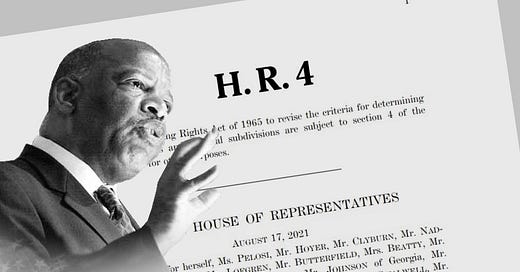H.R. 4 is an important first step, but it's still just a first step
Defending American democracy will require more than preclearance
On Tuesday, the House of Representatives passed a landmark piece of legislation—H.R. 4, the John Lewis Voting Rights Advancement Act. Although that bill almost certainly faces a steep uphill climb in the Senate, it’s passage in the House still represents an important step forward.
Included within the bill is a revival of section 4 of the Voting Rights Act of 1965. Section 4 lays out a “coverage formula” that determines which states and other political subdivisions (counties, cities, utility districts, and so forth) section 5 of the Act applies to. Section 5 requires that covered jurisdictions obtain federal approval before changing their voting laws. In 2013, the original section 4 was struck down by the Supreme Court in Shelby County v. Holder. That section 4 included a number of jurisdictions that had a history of voter suppression. The Supreme Court insisted, however, that “things ha[d] changed in the South” and invalidated the coverage formula as outdated. As a result, section 5 was left inoperative. The Court, however, left open the possibility that Congress could re-enact section 4 with an updated coverage formula and, by doing so, reactivate section 5.
H.R. 4 aims to provide that updated coverage formula.
But while a reactivated section 5 will be an important tool in the fight against future voter suppression, it does little to combat the voter suppression laws already on the books. And it does almost nothing to address the issue of extreme partisan gerrymandering. Thus, H.R. 4 must be understood as a first step—an important one, but still a first step. Without further action, our democracy remains in peril.
Although the debate over voter suppression and gerrymandering is often framed in partisan terms—through the lens of “which party benefits” rather than “what’s the right thing to do”—both types of action are harmful to all ordinary Americans, not just the supporters of one party.
Democracy is an essential part of our constitutional republic. It’s what gives our government legitimacy. It’s how we hold our leaders accountable. When politicians know that their reelection isn’t certain, they’re more attentive to what their constituents want. Their reelection isn’t assured so they need to keep their voters happy to maximize their chances. If they know that voter suppression and computer-generated gerrymanders all but guarantee them another term, they have no reason to truly represent you.
The fight to preserve democracy isn’t partisan: it’s American.




